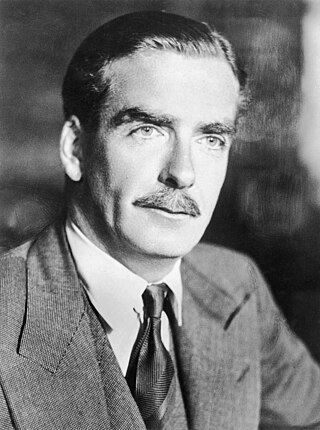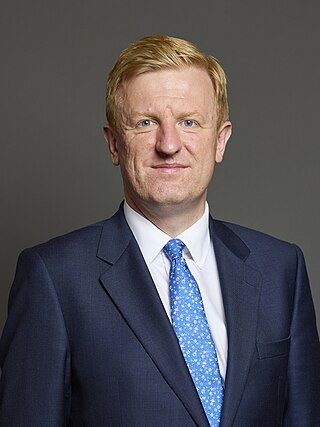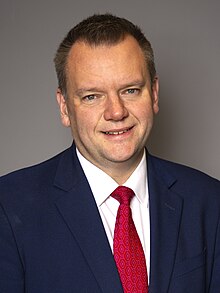
The secretary of state for foreign, Commonwealth and development affairs, also known as the foreign secretary, is a secretary of state in the Government of the United Kingdom, with responsibility for the Foreign, Commonwealth and Development Office. The role is seen as one of the most senior ministers in the UK Government and is a Great Office of State. The incumbent is a member of the Cabinet of the United Kingdom and National Security Council, and reports directly to the prime minister.

The deputy prime minister of the United Kingdom is an honorific title given to a minister of the Crown and a member of the British Cabinet, normally to signify a very senior minister, the deputy party leader, or a key political ally of the prime minister. It does not entail any specific legal responsibilities, though the holder may be assigned some, and is usually paired with a departmental secretary of state position. The title is not always in use and prime ministers have been known to appoint informal deputies without the title of deputy prime minister. The current deputy prime minister is Angela Rayner.

The Chancellor of the Duchy of Lancaster is a ministerial office in the Government of the United Kingdom. Excluding the prime minister, the chancellor is the highest ranking minister in the Cabinet Office, immediately after the prime minister, and senior to the Minister for the Cabinet Office. The role includes as part of its duties the administration of the estates and rents of the Duchy of Lancaster.
A sinecure is a position with a salary or otherwise generating income that requires or involves little or no responsibility, labour, or active service. The term originated in the medieval church, where it signified a post without any responsibility for the "cure [care] of souls", the regular liturgical and pastoral functions of a cleric, but came to be applied to any post, secular or ecclesiastical, that involved little or no actual work. Sinecures have historically provided a potent tool for governments or monarchs to distribute patronage, while recipients are able to store up titles and easy salaries.

Sir David Roy Lidington is a former British politician who was the Member of Parliament (MP) for Aylesbury from 1992 until 2019. A member of the Conservative Party, he served as Chancellor of the Duchy of Lancaster and Minister for the Cabinet Office from 2018 to 2019 and was frequently described as being Theresa May's de facto Deputy Prime Minister.

First Secretary of State is an office that is sometimes held by a minister of the Crown in the Government of the United Kingdom. The office indicates seniority, including over all other secretaries of state. The office is not always in use, so there have sometimes been extended gaps between successive holders.

The National Government of 1937–1939 was formed by Neville Chamberlain on his appointment as Prime Minister of the United Kingdom by King George VI. He succeeded Stanley Baldwin, who announced his resignation following the coronation of the King and Queen in May 1937.

Neville Chamberlain formed the Chamberlain war ministry in 1939 after declaring war on Germany. Chamberlain led the country for the first eight months of the Second World War, until the Norway Debate in Parliament led Chamberlain to resign and Winston Churchill to form a new ministry.

The Conservative government of the United Kingdom that began in 1957 and ended in 1964 consisted of three ministries: the first Macmillan ministry, second Macmillan ministry, and then the Douglas-Home ministry. They were respectively led by Harold Macmillan and Sir Alec Douglas-Home, who were appointed by Queen Elizabeth II.

The Downing Street chief of staff is the most senior political appointee in the Office of the Prime Minister of the United Kingdom, acting as a senior aide to the Prime Minister of the United Kingdom. The holder of the office retains a highly powerful, non-ministerial position within His Majesty's Government.

The UK Shadow Cabinet was appointed by Conservative Party leader Iain Duncan Smith. Following his initial appointments in September 2001 Smith managed three reshuffles before his resignation as leader in November 2003.

Gordon Brown formed the Brown ministry after being invited by Queen Elizabeth II to form a new government following the resignation of the previous prime minister of the United Kingdom, Tony Blair, on 27 June 2007. Brown formed his government over the course of the next day, with Jacqui Smith being appointed the United Kingdom's first female home secretary.

Margaret Thatcher was Prime Minister of the United Kingdom from 4 May 1979 to 28 November 1990, during which time she led a Conservative majority government. She was the first woman to hold that office. During her premiership, Thatcher moved to liberalise the British economy through deregulation, privatisation, and the promotion of entrepreneurialism.

Margaret Thatcher was Prime Minister of the United Kingdom from 4 May 1979 to 28 November 1990, during which time she led a Conservative majority government. She was the first woman to hold that office. During her premiership, Thatcher moved to liberalise the British economy through deregulation, privatisation, and the promotion of entrepreneurialism.

The Eden ministry was formed following the resignation of Winston Churchill in April 1955. Anthony Eden, then-Deputy Prime Minister and Foreign Secretary, took over as Leader of the Conservative Party, and thus became Prime Minister of the United Kingdom. Upon assuming office, Eden asked Queen Elizabeth II to dissolve parliament and called a general election for May 1955. After winning the general election with a majority of 60 seats in the House of Commons, Eden governed until his resignation on 10 January 1957.

Sir Oliver James Dowden, is a British Conservative Party politician who has been the Member of Parliament (MP) for Hertsmere since 2015. He has served as Deputy Leader of the Opposition and Shadow Chancellor of the Duchy of Lancaster since July 2024. He served as Deputy Prime Minister of the United Kingdom and Secretary of State in the Cabinet Office from 2023 to 2024 and as Chancellor of the Duchy of Lancaster from 2022 to 2024.

The third Blair ministry lasted from May 2005 to June 2007. The election on 5 May 2005 saw Labour win a historic third successive term in power, though their majority now stood at 66 seats – compared to 167 four years earlier – and they failed to gain any new seats. Blair had already declared that the new term in parliament would be his last.

The Shadow Deputy Prime Minister of the United Kingdom is a position in the United Kingdom's Shadow Cabinet that was created on 6 December 2005 by the then-Leader of the Opposition, David Cameron for his shadow cabinet. From 2005 to 2010, the office was known as Senior Member of the Shadow Cabinet, and from 2015 to 2023, the office was known as Shadow First Secretary of State. From 2010 to 2015 and again since 2023, the office has been known as Shadow Deputy Prime Minister.







































